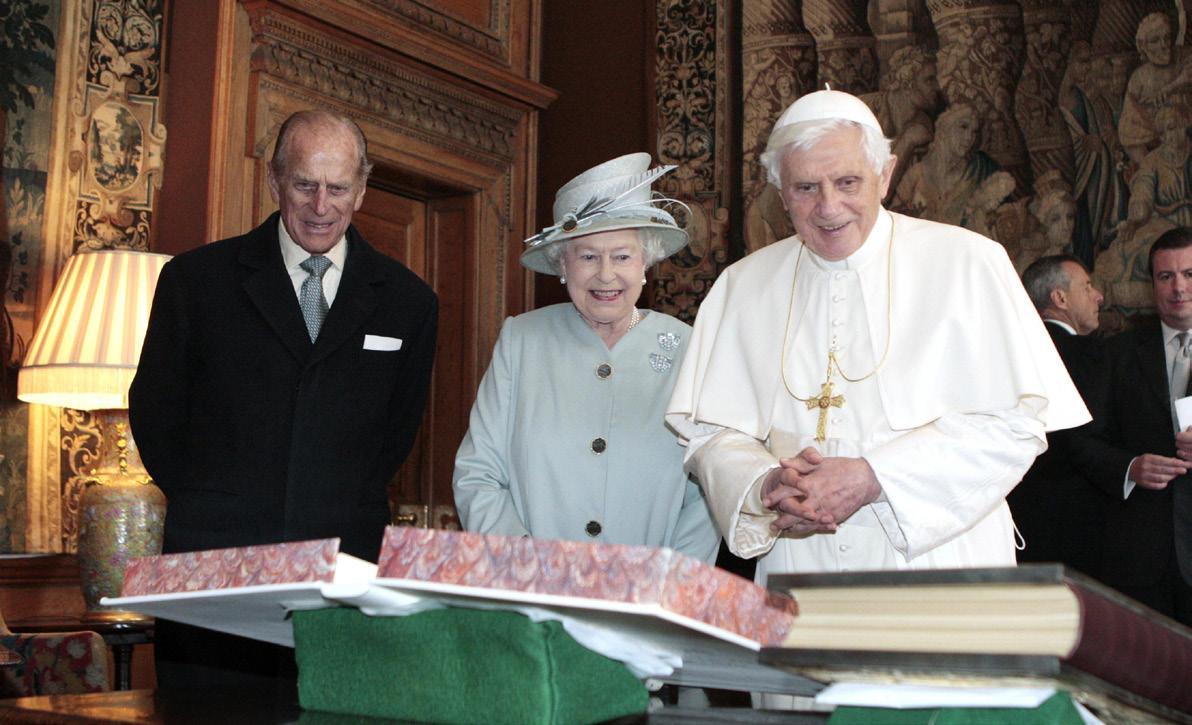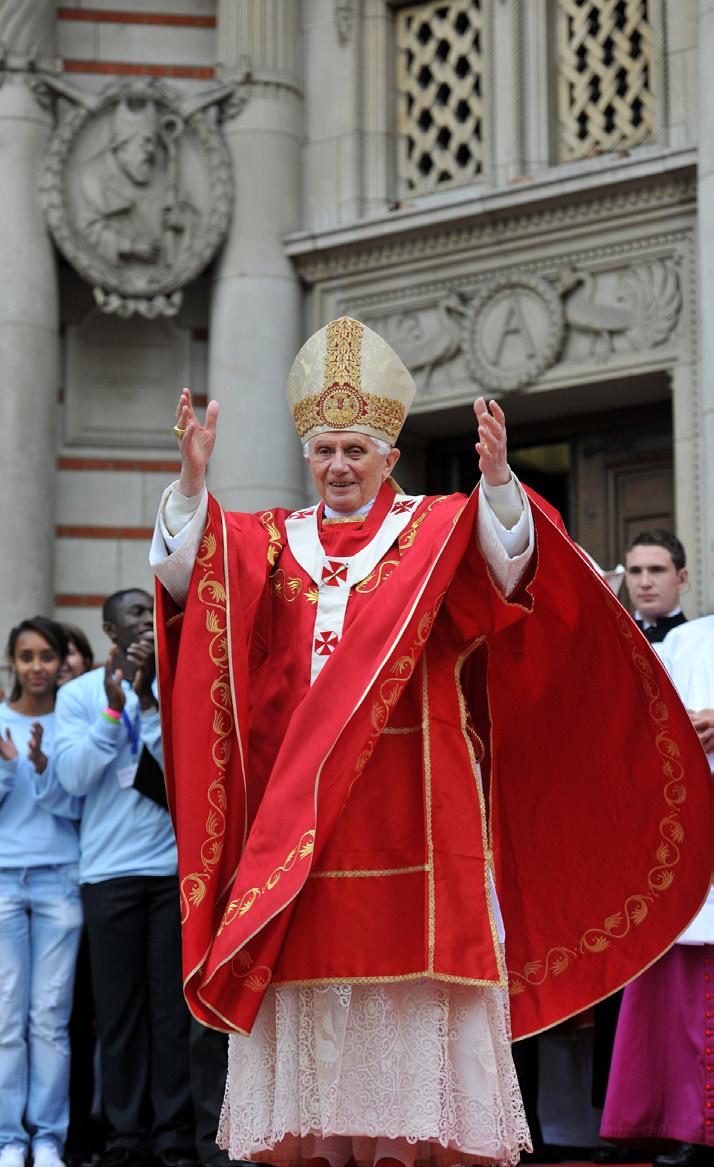
5 minute read
Pope Benedict's UK State Visit
Andrew Cusack remembers Pope Benedict’s visit to Britain in 2010 and his liberation of the Old Rite
Proximity to events is an inherent danger in rendering historical judgement, which means it is probably too soon to describe the late Pope Benedict XVI as one of the most important pontiffs for the history of Catholicism in Great Britain since the Reformation. Benedict’s gentleness and erudition stood him in great stead and earned him the love and respect of many Catholics as well as other Christians and non-believers.
Most memorable was his 2010 State Visit to the United Kingdom – the first official State Visit of any reigning Pontiff to this realm. The visit began with an historic arrival in Edinburgh, the second city of the union, where he was welcomed by Queen Elizabeth II and Prince Philip, Duke of Edinburgh – both of whom predeceased Benedict. Papal Masses in Glasgow and Westminster preceded a well-attended liturgy in Birmingham during which Pope Benedict beatified John Henry Newman, the scholar and churchman whose influence has guided, swayed, and encouraged many people from around the English-speaking world to come into full communion with the See of Peter.
Among the most important roles of the Pontiff is that of teacher and guide. In that capacity, Benedict XVI was given the privilege of addressing a joint sitting of the Lords and Commons in Parliament assembled on the fifth day of his visit in the medieval great hall of the Palace of Westminster which had witnessed the trial of St Thomas More, sometime Speaker of the House of Commons and Lord Chancellor of England.
Pope Benedict acknowledged the deep and abiding influence that Westminster, in one shape or another, has had on the evolution of participatory democracy which is now held as the common standard of government across most of the planet. In addressing the gathered lawmakers, he reminded them that, rather than an end it itself, democracy is instead a tool for the promotion of the common good.
He also reminded these paragons of Britain’s highly secularised political class that religion has an informative role to play in the process of government.
“If the moral principles underpinning the democratic process are themselves determined by nothing more solid than social consensus,” Benedict told Parliament, “then the fragility of the process becomes all too evident.”
“Herein,” the teaching pontiff asserted, “lies the real challenge for democracy.”
In a democratic society, Benedict contended, the clarity and logic which religion contains is a handmaid to democratic government rather than an obstacle, with a helpful role to play even in secular societies. The defence of objective truth and reality which Benedict upheld in 2010 appears all the more prescient more than a decade later, considering virulent assaults on biological reality have moved from academic fringes into the cultural mainstream. Once again, today in Europe and North America it is the Church who is defending science against science’s enemies.
For anyone needing an insightful and timely reflection on the value of public service to the nation and the value of religion to politics, Pope
Benedict’s address in the Palace of Westminster will remain a touchstone for years to come.
Another accomplishment from Benedict’s papacy had particular resonance here in the United Kingdom. Since the introduction of the new liturgy following the Second Vatican Council, Great Britain has acted as an attractive pole of appreciation for the spiritual, aesthetic, musical, and cultural value of the traditional liturgy of the Roman Rite. The role in which the letter signed by, among other cultural figures, the detective writer Agatha Christie, in preserving the faithful’s access to the traditional liturgy has now become almost legendary.
If Britons can bear any badge of pride in today’s universal church, it is that from these isles came the indult which allowed the Mass of Ages to persist, to survive, and eventually to thrive.
The 2007 motu proprio Summorum Pontificum had the effect of liberating the “Old Rite” from the shackles that had been arbitrarily imposed upon it, and made a wise attempt to end the liturgical civil wars that had plagued many a diocese across the world by allowing for a tolerance of diversity of forms of worship. The increase in devotion to the Eucharist and appreciation of the traditional rites which followed Benedict’s motu proprio was not limited merely to ostensibly side-lined factions but flourished at the heart of the Church in parishes across the United Kingdom and well beyond.
The limitations and restrictions which have since been imposed on the celebration of the traditional Roman liturgy since Pope Benedict’s abdication have been frustrating for many around the world, even if the overwhelming preponderance of Catholic bishops in England and Wales have been quite pastoral and accommodating in their approach. Indeed, the perception of threat to this beautiful and immensely rewarding liturgy has in some ways renewed the zeal and fervour which are necessary for its propagation and defence.
It would be tempting to wonder what Saint John Henry Newman – born in London, beatified in Birmingham, and canonised in Rome – would make of Pope Benedict and his contribution to the English cardinal’s native land. I can’t help but imagine in their case Heaven might resemble the Senior Common Room of an Oxford college to which both Benedict XVI and St John Henry Newman occasionally repair for a brief conversation – before returning to the celestial college chapel to adore the Creator of all.












